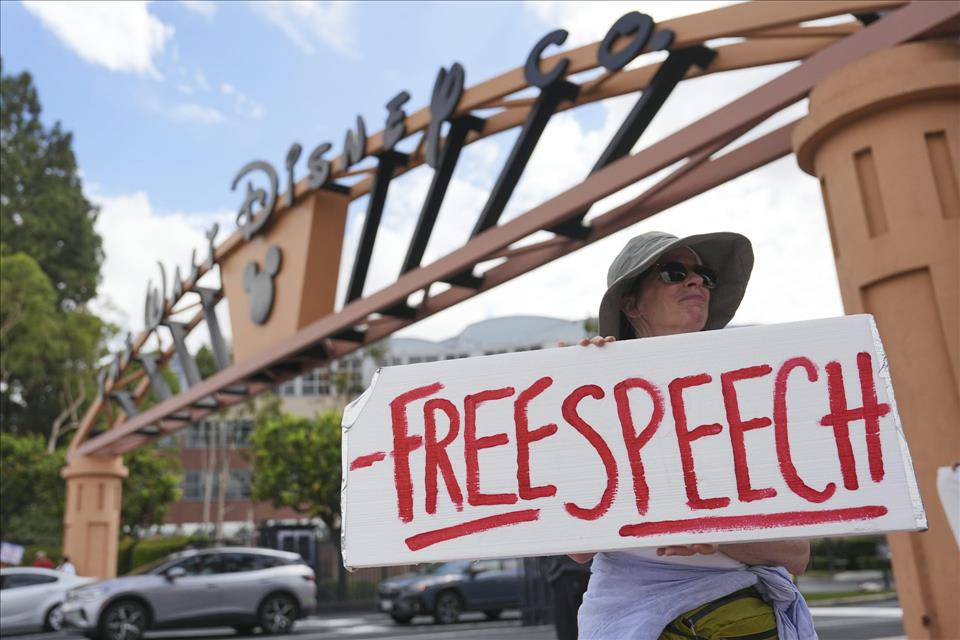
Why The Politics Of Cancellation Never Works
A common fantasy from those on all positions of the ideological spectrum is the belief that if one group, or several groups, of people were simply removed from public discourse, problems would be solved and politics would become functional.
Whether it's United States President Donald Trump insisting the homeless population of Washington D.C., should be removed or Jimmy Kimmel and other late-night comedians should be taken off the air, the goal is to practise politics by subtraction.
Many on the left got caught up in stories about Trump's declining health and the possibility that illness would remove him from office. Others, like American author and professor Roxanne Gay , argue that liberals cannot, and should not, engage with or be civil to conservatives, who are simply terrible people.
The animating belief of a politics of cancellation is that a functional society just beneath the surface will emerge if only the right people are removed.
Cancellation at odds with democracyIn the United States, cancellation is everywhere right now: there are calls to remove trans people from public life , to label the opposition party a “domestic, extremist organization,” to impeach Supreme Court Justice Clarence Thomas .
But this is largely political theatre, not a constructive form of collective problem-solving.
Removing homeless people from Washington, D.C., or any other city may make urban streets appear“clean” or“safe” to some, but the structural and moral issues represented by homelessness will persist and metastasize out of sight. The unhoused still won't have homes.

Armed National Guardsmen patrol near a homeless person on the National Mall in August 2025 in Washington, D.C. (AP Photo/Julia Demaree Nikhinson)
Remove Trump, and J.D. Vance becomes president, amplifying the hard right turn of the last year in the U.S. In politics, collective problems cannot be solved by cancellation or removal.
Perhaps even more importantly, democracy cannot survive the practice of cancellation, nor will it produce the stability imagined once one group of people is eliminated from public discourse.
The work of democracy is always inclusion . Effective, collective decision-making rests on the possibility of persuasion to change minds and create consensus from disagreement.
Cancellation or subtraction are moves to eliminate the possibility of persuasion in favour of silence. To eliminate the practice of persuasion is to transform a society from democracy to authoritarianism.
Reconciling differencesIn interpersonal communication , we know that when partners stonewall, silence or turn away from their significant other, the relationship runs into deep trouble.
The same is true for the kinds of constructive relationships between strangers required by democracy - when we turn away from our fellow citizens or silence them, functional communication processes and the possibility of persuasion are no longer available.
Even if we managed to cancel or subtract some group, the challenge of collective decision-making remains. There is no utopia just beyond successful cancellation, nor could there be given the requirements of democracy to reconcile differences in productive ways.
In interpersonal relationships, we know how damaging the Ziegarnik effect can be , which is the way unprocessed negative interactions stick with people and gradually erode trust. In other words, a problem unresolved is like a pebble stuck in our shoe, digging at us and causing additional problems.
The ideas and perspectives of people who face cancellation continue to circulate, stuck in our collective public discourse, causing deeper, future problems. Inclusion is a prerequisite for persuasion, transformation and change because it allows us to deal squarely with the problems we confront instead of leaving them unresolved.
Cancellation is a primary tool of fascism and authoritarianism. To blame and demonize one group of people for society's ills is an easy way to explain away problems and consolidate power.
But the antidote to cancellation cannot be more cancellation. Jimmy Kimmel actively showed the way in his monologue upon returning from temporary cancellation. He offered a sophisticated defence of free speech that practised the inclusion of voices he usually criticized. Kimmel was civil in a deep way that is essential for democracy.
Jimmy Kimmel's monologue after his brief cancellation. (Jimmy Kimmel Live!) The importance of comedy
Comedy itself is a mode of criticism that can preserve the social order and resist the urge to cancel. This is why comedy is woven into the social fabric of democracies and not into authoritarian governments.
We poke fun to let others know we disagree, sometimes vehemently, but that kind of engagement keeps the conversation going and opens possibilities for change.
Those on the left, the remaining defenders of democracy, make a mistake when they attempt to practise a politics of cancellation, as do those on the right. A politics of inclusion is always the antidote and the best method of problem-solving.
Societies flourish and prosperity grows through inclusion not subtraction. Historians of democracy know this.

Legal Disclaimer:
MENAFN provides the
information “as is” without warranty of any kind. We do not accept
any responsibility or liability for the accuracy, content, images,
videos, licenses, completeness, legality, or reliability of the information
contained in this article. If you have any complaints or copyright
issues related to this article, kindly contact the provider above.


















Comments
No comment